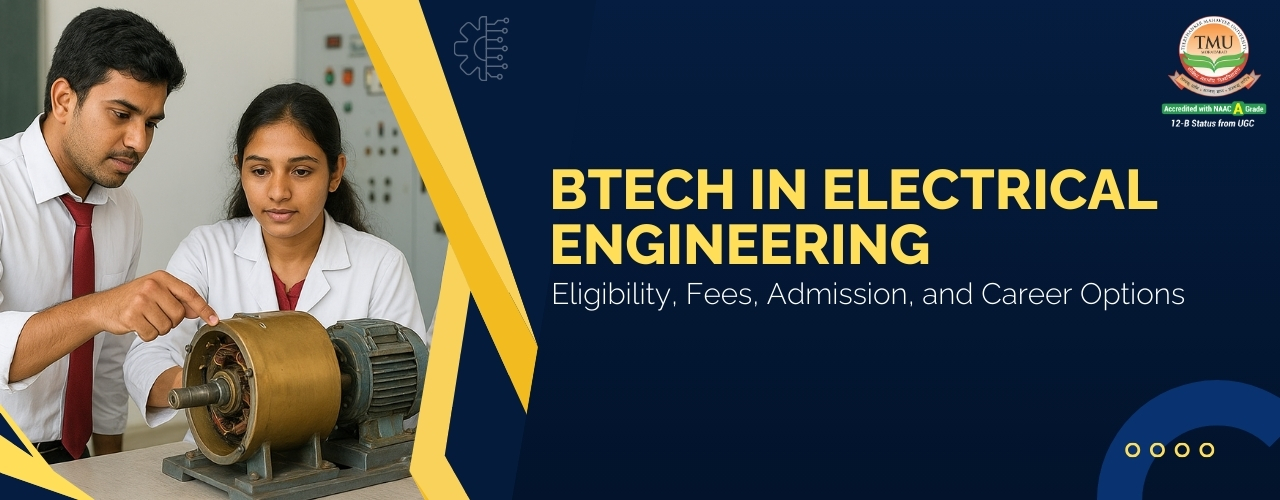BTech in Electrical Engineering: Eligibility, Fees, Admission, and Career Options
Table of Contents
A BTech in Electrical Engineering equips students with the knowledge and technical skills required to design, develop, and maintain electrical systems, machinery, and equipment. From power generation and transmission to microelectronics and automation, this branch of engineering plays a crucial role in the world we live in.
In today’s digital and energy-driven era, electrical engineers are not limited to working with wires and circuits; they are at the forefront of innovations like smart grids, renewable energy solutions, electric vehicles, and even artificial intelligence applications in automation. This is why B.Tech Electrical Engineering continues to be a highly preferred course for students who are interested in technology, problem-solving, and innovation.
Moreover, electrical engineers observe themselves working across diverse industries like power plants, electronics manufacturing, IT, telecommunication, and robotics. Students who pursue this degree often enjoy stable career opportunities, high-paying jobs, and options for further research or entrepreneurship.
So, if you’re a student thinking of pursuing a BTech in Electrical Engineering, it’s worth understanding the eligibility criteria, fees, admission process, and future career options. Let’s break it down in detail.
What is a BTech in Electrical Engineering?
A Bachelor of Technology in Electrical Engineering is a four-year undergraduate degree program that focuses on the study and application of electricity, electromagnetism, and electronics. It blends theoretical knowledge with hands-on practical training through lab sessions, projects, and industrial internships.
The curriculum covers a broad spectrum of topics, including:
- Power generation, transmission, and distribution
- Electrical machines and drives
- Control systems
- Circuit theory and networks
- Power electronics
- Microprocessors and microcontrollers
- Renewable energy technologies
The course is divided into eight semesters over four years, with each semester including a mix of theory papers, lab work, and projects. In the final year, students usually work on an industrial project or research-based dissertation, which prepares them for real-world challenges.
Additionally, many colleges now integrate emerging technologies like artificial intelligence, Internet of Things (IoT), smart grids, and electric vehicle technology into the syllabus, making the course even more industry-relevant.
In short, this programme doesn’t just prepare students to become traditional electrical engineers—it equips them to make an important contribution to shaping the future of energy and technology.
Teerthanker Mahaveer University
Apply for Admission
Click Here To Apply for Admission
BTech in Electrical Engineering – Course Overview
| Particulars | Details |
| Course Name | BTech in Electrical Engineering |
| Level | Undergraduate (UG) |
| Duration | 4 Years (8 Semesters) |
| Eligibility | 10+2 with Physics, Chemistry, and Mathematics (PCM) with minimum 50–60% marks (varies by college) |
| Admission Process | Entrance Exams (JEE Main, JEE Advanced, State Exams, University Exams) / Merit-based / Direct Admission in Private Colleges |
| Average Course Fees | ₹50,000 – ₹2.5 Lakhs per year (Government)₹1.5 Lakhs – ₹4 Lakhs per year (Private) |
| Core Subjects | Electrical Machines, Power Systems, Control Systems, Power Electronics, Circuit Theory, Microprocessors, Renewable Energy |
| Specializations/Electives | Smart Grids, Electric Vehicles, Robotics & Automation, Renewable Energy, AI in Electrical Systems |
| Practical Learning | Lab sessions, Industrial Training, Internships, Final Year Project |
| Top Colleges | IITs, NITs, BITS Pilani, VIT, SRM, Anna University, Jadavpur University |
| Job Profiles | Electrical Engineer, Power Engineer, Design Engineer, Control Systems Engineer, Project Engineer, R&D Engineer |
| Top Recruiters | NTPC, BHEL, Power Grid, Siemens, ABB, L&T, Tata Power, Schneider Electric, Reliance, Adani |
| Average Starting Salary | ₹3–6 LPA (Private Sector)₹8–12 LPA (Government/PSUs)₹10–15 LPA (IIT/NIT graduates in top MNCs) |
| Higher Studies Options | MTech, MBA, MS (Abroad), Research (PhD) |
| Future Scope | Renewable Energy, Electric Vehicles, Smart Grids, Automation & Robotics, AI-Integrated Systems |
Eligibility Criteria for B.Tech in Electrical Engineering
Before applying, students must meet the eligibility criteria for admission to the programme. The criteria may slightly differ from one college to another, but the general requirements are as follows:
- Educational Qualifications:
- Candidates must have completed 10+2 (or equivalent) with Physics, Chemistry, and Mathematics (PCM) as compulsory subjects.
- Some universities may also accept students with a background in computer science along with PCM.
- Minimum Marks Required:
- Most top universities require a minimum of 50–60% aggregate marks in PCM at the 12th standard.
- For reserved category students (SC/ST/OBC), there may be relaxation in marks as per government regulations.
- Age Limit:
- Generally, the minimum age for admission is 17 years. Some colleges may have an upper age limit of 23–25 years, especially for entrance exams.
- Entrance Exams:
- Admissions to reputed engineering colleges like IITs, NITs, and many state universities are based on performance in national or state-level entrance exams such as:
- JEE Main and JEE Advanced
- State-level engineering entrance tests (WBJEE, KEAM, KCET, MHT CET, etc.)
- Private university exams.
Thus, a candidate must have a solid academic background in science, particularly in mathematics and physics, to gain admission.
Admission Process for B.Tech in Electrical Engineering
Getting admission into a B.Tech. Electrical Engineering programme can happen through three major routes:
- Merit-Based Admission:
- In some universities, students are admitted purely based on their 12th-grade marks.
- This is common in private colleges where entrance exams are not mandatory.
- Entrance Exam-Based Admission:
- The most common route for admission to top-tier engineering institutes is through entrance exams.
- For IITs and NITs, clearing JEE Main and Advanced with high ranks is mandatory.
- State universities often conduct their entrance tests.
- Direct Admission in Private Colleges:
- Many private colleges offer direct admission through the management quota, where students can secure a seat by paying higher fees or donations.
- While this ensures admission, the cost of study is usually much higher.
After the entrance exams, students undergo counselling sessions where seats are allocated based on their rank, preferences, and availability. Finally, document verification and fee payment confirm the admission.
This structured process ensures that the best candidates get into the most reputed institutions, though opportunities are available at various levels to suit students from different backgrounds.
Fees Structure of B.Tech in Electrical Engineering
The fees for a BTech in Electrical Engineering depend largely on the type of institution—government, private, or deemed university. Let’s look at the average fee ranges:
- Government colleges (IITs, NITs, and state universities):
- Tuition fees range from ₹50,000 to ₹250,000 per year.
- Many government institutions also provide scholarships and fee waivers for meritorious or economically weaker students.
- Private Colleges and Deemed Universities:
- Fees in private institutions can be significantly higher, usually ranging between ₹1,50,000 to ₹4,00,000 per year.
- Reputed private universities like BITS Pilani, VIT, SRM, and Manipal may have higher annual fees.
- Additional Expenses:
- Hostel and accommodation: ₹40,000 – ₹1,00,000 per year
- Books and stationery: ₹10,000 – ₹20,000 per year
- Laboratory and exam fees: ₹5,000 – ₹15,000 per year
Thus, the total cost of pursuing a BTech in Electrical Engineering may range between ₹4–15 lakhs for the entire four-year programme, depending on the institution.
Many students manage costs by availing educational loans, scholarships, and government-funded schemes. This ensures that financial background does not stop deserving candidates from pursuing the degree.
Top Colleges Offering B.Tech in Electrical Engineering In Uttar Pradesh
| College/University | Location | Highlights |
| Teerthanker Mahaveer University (TMU) | Moradabad | Modern labs, industry-oriented curriculum, experienced faculty, strong placement support, scholarships available |
| Indian Institute of Technology (IIT) Kanpur | Kanpur | One of India’s top IITs, advanced research facilities, global exposure, high placement packages |
| Motilal Nehru National Institute of Technology (MNNIT) | Allahabad (Prayagraj) | Renowned NIT with excellent academics, strong alumni network, and good placements |
| Harcourt Butler Technical University (HBTU) | Kanpur | Oldest engineering college in UP, strong academic reputation, government support |
| Institute of Engineering & Technology (IET) | Lucknow | Leading state government college, affordable fees, good placement record |
| Aligarh Muslim University (AMU) | Aligarh | Prestigious central university, strong faculty, and diverse campus life |
| Galgotias University | Greater Noida | Industry collaborations, modern infrastructure, high placement opportunities |
Syllabus and Subjects in B.Tech Electrical Engineering
The BTech Electrical Engineering syllabus is designed to build a strong foundation in electrical sciences, mathematics, and modern technology applications. Students experience theory, labs, and industry projects over the course of eight semesters.
Core Subjects:
- Engineering Mathematics (I, II, III)
- Basic Electrical and Electronics Engineering
- Circuit Theory and Networks
- Electrical Machines (I & II)
- Power Systems (Generation, Transmission & Distribution)
- Control Systems
- Power Electronics and Drives
- Microprocessors and Microcontrollers
- Signals and Systems
- High Voltage Engineering
Laboratory Work:
- Electrical Machines Lab
- Circuit Simulation and Design Lab
- Power Electronics Lab
- Microcontroller and Embedded Systems Lab
- Renewable Energy Lab
Electives & Specialisations:
In the later years, students can opt for electives like:
- Smart Grids
- Renewable Energy Technologies
- Electric Vehicle Technology
- Artificial Intelligence in Electrical Engineering
- Robotics and Automation
Projects and Internships:
- Mini projects (2nd & 3rd year)
- Major final-year project
- The mandatory industrial internship typically takes place in power plants, manufacturing units, or electronics companies.
This diverse syllabus gains technical knowledge and the practical skills required to succeed in industry.
Skills Required for B.Tech in Electrical Engineering
While academic knowledge is essential, employers also look for specific skills in electrical engineering graduates. To excel in this field, students should focus on developing the following:
Technical Skills:
- Strong understanding of mathematics and physics concepts.
- Proficiency in circuit design and simulation software (MATLAB, PSpice, AutoCAD Electrical).
- Hands-on knowledge of electrical machines, drives, and power systems.
- Programming skills in C, Python, and embedded systems for modern electrical applications.
Analytical and Problem-Solving Skills:
- Ability to diagnose and solve electrical faults.
- Designing efficient energy systems.
- Applying theoretical concepts to real-world challenges.
Soft Skills:
- Communication skills for client interactions and teamwork.
- Time management and multitasking, especially important in project-based roles.
- Adaptability to rapidly evolving technologies like renewable energy and IoT.
Creativity & Innovation:
Electrical engineers are often at the intersection of energy and technology. Creative thinking helps them develop solutions like smart grids, energy-efficient appliances, and green power systems.
Thus, students should focus on a mix of technical expertise and personal development to stand out in a competitive job market.
Career Options After BTech in Electrical Engineering
A B.Tech in Electrical Engineering opens up numerous career opportunities across diverse sectors. Unlike some speciality branches, electrical engineering graduates enjoy a broad career scope because electricity is fundamental to almost every industry.
Core Electrical Sector:
- Power Generation and Distribution Companies – working in thermal, hydro, nuclear, or renewable power plants.
- Electrical Design Engineer – designing electrical systems for industries and infrastructure.
- Control and Instrumentation Engineer – maintaining automated systems in manufacturing.
Electronics and IT Sector:
- Many electrical engineers find jobs in the electronics, semiconductor, and IT industries.
- Roles include chip design, embedded systems, IoT solutions, and automation.
Government and Public Sector Jobs:
- PSUs like NTPC, BHEL, Power Grid, ONGC, GAIL, and Indian Railways recruit electrical engineers through GATE and other competitive exams.
- Jobs in defence, DRDO, ISRO, and electricity boards are also popular.
Higher Studies and Research:
- Many students pursue an MTech in Electrical Engineering, Renewable Energy, or Power Systems.
- Some individuals pursue an MBA to transition into management roles.
- Research opportunities in AI, robotics, and renewable technologies are growing.
Entrepreneurship:
- With the rising demand for green energy solutions, EV charging infrastructure, and home automation, electrical engineers can also start their own businesses.
In short, a BTech in Electrical Engineering is not just a degree—it’s a passport to multiple industries and career paths.
Job Profiles and Roles
Electrical engineering graduates can take up a variety of roles depending on their specialisation and interests. Some popular job profiles include:
- Electrical Engineer: Designing, developing, and testing electrical systems in industries.
- Power Engineer: Working in power plants, managing transmission and distribution networks.
- Control Systems Engineer: Designing automation systems for factories and industries.
- Design Engineer: Creating blueprints for electrical machinery and equipment.
- Maintenance Engineer: Ensuring the smooth functioning of electrical equipment in industries.
- Research & Development Engineer: Innovating new technologies in energy, robotics, and automation.
- Project Engineer: Leading electrical projects in construction, telecom, and power sectors.
Each of these roles comes with unique challenges and growth opportunities. For instance, a power engineer may work in renewable energy plants, while a control systems engineer may focus on AI-driven automation.
The diversity of roles ensures that electrical engineers can find a career suited to their passion, whether it’s hands-on technical work, research, or management.
Top Recruiters for Electrical Engineering Graduates
One of the biggest advantages of pursuing a BTech in Electrical Engineering is the sheer number of recruiters available across different sectors. Since electricity is a necessity in almost every industry, electrical engineers find career opportunities not just in power plants but also in IT, telecom, construction, manufacturing, and renewable energy.
Government Sector Companies (PSUs):
Public Sector Undertakings are among the most attractive recruiters for electrical engineers due to job security, excellent salaries, and benefits. Some top PSUs hiring electrical engineers are:
- NTPC (National Thermal Power Corporation) – Power generation.
- BHEL (Bharat Heavy Electricals Limited) – Manufacturing heavy electrical equipment.
- Power Grid Corporation of India – Electricity transmission.
- ONGC, GAIL, and IOCL – Hiring for energy-related projects.
- Indian Railways and Electricity Boards – Maintenance and infrastructure.
Recruitment is usually done through the GATE exam followed by interviews.
Private Sector Companies:
Top private recruiters include:
- Siemens – Automation and power solutions.
- ABB (ASEA Brown Boveri) – Electrical equipment and robotics.
- Larsen & Toubro (L&T) – Power and construction projects.
- General Electric (GE) – Power systems and renewable energy.
- Reliance, Adani, and Tata Power – Energy and power distribution.
Global MNCs and Startups:
- MNCs like Schneider Electric, Philips, Honeywell, and Samsung actively hire electrical engineers.
- Startups in renewable energy, electric vehicles, and IoT also provide exciting career opportunities for young engineers.
With such a wide range of recruiters, graduates can choose jobs based on their interests—whether it’s research, fieldwork, design, or management.
Salary Packages After B.Tech in Electrical Engineering
The salary of an electrical engineer depends on factors such as college reputation, job profile, recruiter, and skill set. However, this branch is considered highly rewarding in terms of long-term earnings.
Entry-Level Salaries:
- Freshers from top IITs/NITs can expect ₹8–15 LPA (lakhs per annum).
- Average private college graduates earn around ₹3–6 LPA in their first job.
Mid-Level Salaries (5–10 years experience):
- With experience, salaries can rise to ₹10–20 LPA, especially for those working in MNCs or specialised industries like renewable energy and robotics.
- Government sector engineers in PSUs earn around ₹8–12 LPA, along with additional allowances and perks.
High-Level Salaries (15+ years experience):
- Senior professionals in leadership roles can earn ₹25–40 LPA or more.
- International job opportunities in the Middle East, Europe, and the US can push salaries even higher.
Government vs. Private Sector Salary Comparison:
| Sector | Entry-Level Salary | Growth | Stability |
| Government PSUs | ₹8–10 LPA + perks | Moderate | Very High |
| Private Sector | ₹3–15 LPA | High (based on skills) | Moderate |
| Startups | ₹4–8 LPA | Very High (equity options possible) | Risky |
Thus, while government jobs offer stability, the private sector often rewards skills and innovation with faster salary growth.
Future Scope of Electrical Engineering
Electrical engineering is one of those fields that will never go out of demand. With rapid technological advancement, the scope of electrical engineers is only expanding.
Growing Industries and Sectors:
- Renewable Energy – Solar, wind, and hydropower are seeing exponential growth.
- Electric Vehicles (EVs) – EV charging infrastructure and battery management are booming.
- Smart Grids and Smart Cities – Increasing demand for intelligent energy systems.
- Robotics and Automation – Industries are moving towards AI-driven automated systems.
Impact of Renewable Energy:
With governments worldwide pushing for sustainable energy, electrical engineers are needed to design and implement solar farms, wind turbines, and green energy solutions.
Role of AI and IoT:
- Smart appliances, energy-efficient systems, and IoT-based solutions require electrical engineers with coding and AI skills.
- Engineers who combine traditional knowledge with modern tech will be the most in demand.
The future of electrical engineering is not just about electricity—it’s about integrating power with digital technologies to create a smarter, greener world.
Why Choose TMU for BTech in Electrical Engineering
- Industry-Oriented Curriculum – Updated syllabus aligned with the latest technologies like Smart Grids, IoT, AI, Robotics, and Renewable Energy.
- Experienced Faculty – Highly qualified professors with academic expertise and real-world industrial experience.
- Advanced Laboratories – State-of-the-art labs for Power Systems, Electrical Machines, Automation, Robotics, and Renewable Energy.
- Strong Placement Opportunities – Tie-ups with top companies and industries, with dedicated training and placement cell support.
- Research & Innovation Focus – Encouragement for students to engage in research projects, patents, and industry collaborations.
- Internships & Industrial Exposure – Regular internships, workshops, and industry visits to give students practical learning experiences.
- Holistic Development – Beyond academics, TMU promotes leadership, teamwork, communication skills, and personality development.
- Modern Infrastructure – Wi-Fi enabled campus, digital libraries, innovation centers, and technology-driven classrooms.
- Global Exposure – Opportunities for collaborations with international universities and student exchange programs.
- Affordable Fees & Scholarships – Competitive fee structure with merit-based scholarships for deserving students.
- Focus on Emerging Careers – Special training for careers in Electric Vehicles, Renewable Energy, and Automation, ensuring students are industry-ready.
- Supportive Learning Environment – Mentorship programs, student clubs, and technical fests to encourage creativity and innovation.
Conclusion
A BTech in Electrical Engineering is one of the most versatile and rewarding career paths for students passionate about technology, innovation, and problem-solving. From designing electrical systems to leading research in renewable energy and automation, this course opens the door to a wide variety of industries and job roles.
With the rising demand for sustainable energy, electric vehicles, and AI-driven automation, the future looks bright for electrical engineers. Choosing the right college, building strong technical skills, and staying updated with industry trends can ensure a successful and fulfilling career.
So, if you’re someone who loves circuits, machines, and solving complex problems, then BTech in Electrical Engineering could be your perfect choice.
FAQs
Q1. What is the average salary after BTech in Electrical Engineering?
Ans: Freshers usually earn between ₹3–6 LPA, but graduates from IITs/NITs can start with salaries of ₹10–15 LPA. With experience, this can rise significantly.
Q2. Can I get into IIT without JEE for Electrical Engineering?
Ans: No, admission to IITs is strictly based on JEE Advanced. However, private universities and state colleges may have direct admission options.
Q3. Which specialization is best in Electrical Engineering?
Ans: Specializations in Power Systems, Renewable Energy, Electric Vehicles, and Automation are currently in high demand.
Q4. Is Electrical Engineering better than Mechanical Engineering?
Ans: Both are excellent fields. Electrical offers better opportunities in IT, renewable energy, and automation, while Mechanical is strong in manufacturing and automotive.
Q5. What are the government job opportunities for Electrical Engineers?
Ans: Electrical engineers can work in PSUs (NTPC, BHEL, ONGC), Indian Railways, DRDO, ISRO, and State Electricity Boards.
This content gives an overview of the programme and is for educational purposes only. For updated admission guidelines and counselling support, please connect with our Counsellor Team.














